calsfoundation@cals.org
Lonnie Glosson (1908–2001)
Lonnie Glosson popularized the harmonica nationwide and had a hand in several hit songs during a time when radio stations employed harmonica orchestras. From a young age, Glosson’s ability and versatility on the harmonica stood out.
Lonnie Elonzo (Marvin) Glosson was born the seventh of eleven children on February 14, 1908, in Judsonia (White County) to Cora Busby Glosson and George H. Glosson. He later changed his middle name to Elonzo because he did not like the uncle after whom he was named. Glosson’s mother taught him the harmonica after he earned money to buy the instrument by picking cotton: “She showed me how to play ‘Home Sweet Home,’ and I took it from there.” His father owned a boat dock and bait shop and picked mussel shells for a button factory in Newport (Jackson County). George Glosson’s parents had come to Prospect Bluff (later renamed Judsonia) from North Carolina in the 1850s.
Hoboing around the United States, Lonnie Glosson earned a living playing harmonica in barber shops, on street corners, and on radio stations. From KMOX in St. Louis, Missouri, Glosson went to WLS’s National Barn Dance in Chicago, Illinois, where he was paired with Gene Autry. Glosson recorded for Paramount’s Broadway label in the early 1930s and also recorded for the Decca and Mercury labels. Glosson’s early records were of the hillbilly boogie or country variety, but to survive as a performer, Glosson had to be versatile; he could just as easily sing and play a blues, gospel, or pop song. He also played guitar. The Country Music Hall of Fame cites his 1936 song, “Arkansas Hard Luck Blues,” as “an early example of the talking blues popularized by Woody Guthrie and Bob Dylan.”
In 1930, Glosson married Ruth Moore of Providence (White County); they soon divorced but remarried again in 1931 and eventually had six children. His partnership with harmonica player Wayne Raney of Wolf Bayou (Cleburne County) also lasted decades. By 1938, they had a program on KARK radio in Little Rock (Pulaski County), later hosting a national show on WCKY in Cincinnati, Ohio. Glosson and Raney also sold millions of mail-order harmonicas over the airwaves. In 1949, their “Why Don’t You Haul Off and Love Me,” with Raney on vocals and Hot Springs (Garland County) native Henry Glover producing, reached number one on the charts. They recorded several songs with the Delmore Brothers, including the Delmores’ massive hit, “Blues Stay Away From Me,” co-written and produced by Glover, the same year.
Glosson delved more into gospel as the years wore on, self-issuing songs such as “For Christmas Give Jesus Your Soul.” Nicknamed “the Talking Harmonica Man,” he toured mainly in schools. He continued performing into his nineties. Glosson died on March 2, 2001, in Searcy (White County) weeks after his ninety-third birthday and is buried in Kensett (White County).
He received the Ozark Pioneer Music Award in 1999 and was inducted into the George D. Hay Country Music Hall of Fame in 2000.
For additional information:
“Country Singer Known for ‘Talkin’ Harmonica.’” Arkansas Democrat- Gazette, March 4, 2001, p. 6B.
Kingsbury, Paul, ed. The Encyclopedia of Country Music. New York: Oxford University Press, 1998.
“Lonnie Glosson.” AllMusic.com. http://www.allmusic.com/artist/lonnie-glosson-mn0000228017 (accessed August 2, 2023).
Stephen Koch
“Arkansongs”
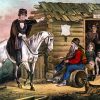 Arts, Culture, and Entertainment
Arts, Culture, and Entertainment Divergent Prosperity and the Arc of Reform, 1968–2022
Divergent Prosperity and the Arc of Reform, 1968–2022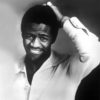 Music and Musicians
Music and Musicians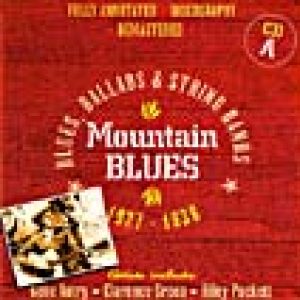 "Arkansas Hard Luck Blues," Performed by Lonnie Glosson
"Arkansas Hard Luck Blues," Performed by Lonnie Glosson 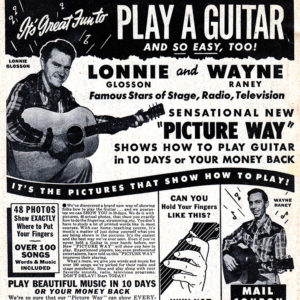 Glosson and Raney Ad
Glosson and Raney Ad 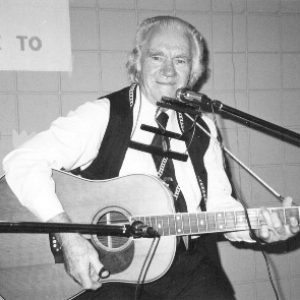 Lonnie Glosson
Lonnie Glosson 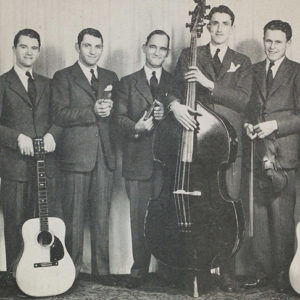 Lonnie Glosson Band
Lonnie Glosson Band 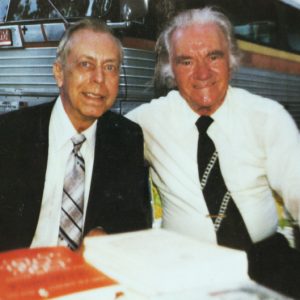 Wayne Raney and Lonnie Glosson
Wayne Raney and Lonnie Glosson 




I enjoyed reading about Wayne Raney and Lonnie Glosson. As a kid in northeastern North Carolina, I listened to the AM station WCKY in Cincinnati a lot. The words that stick in my mind are: Send one dollar and ninety-eight cents to: SMOKE NO MORE, thats SMOKE NO MORE, Cincinnati, 1, Ohio! It was great thinking about that.
Lonnie and my grandparents (Sam and Annie Taylor of Somerville, Alabama) were good friends. Lonnie would show up every now and again in that van of his (spray-painted with his name and harmonicas on the side) and he would have a meal and visit with our family. Later in the night, the family would sit down and play music with Lonnie. It was one of the best memories of my childhood.